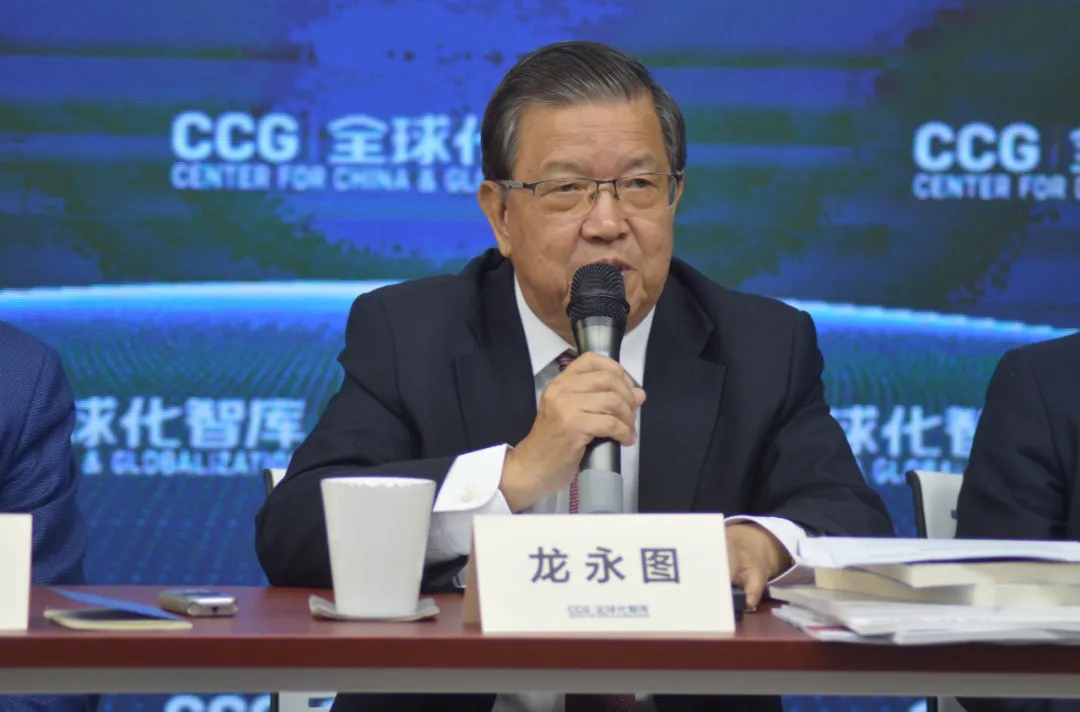Long Yongtu: China becoming a member of the WTO actually results in a win-win situation
May 15 , 2021
Long Yongtu speaking during a forum held by China Center for Globalization on May 14, 2021. /CCG
On December 11, 2001, China officially joined the World Trade Organization (WTO) and became its 143rd member. Since then, the country has gradually opened up its enormous market and attracted massive foreign investments. The great variety of products and services from around the world greatly improved the life of Chinese consumers. Now two decades on, China has grown into the second largest economy and the world’s biggest exporter. But all this wouldn’t be possible if China stayed out of the WTO.
Long Yongtu was the Chief Negotiator for China’s resumption of the General Agreement on Tariffs and Trade (GATT) and its accession to the WTO. Below is an excerpt of his most recent speech on May 14 at the Center for China and Globalization, a Beijing-based think tank.
Why didn’t we join the GATT even after being admitted into the United Nations? Because our thinking wasn’t liberated enough, we thought it was a club of rich nations, and there wasn’t much to be gained. Actually, as one of the 23 original signatories of the GATT, China didn’t need to negotiate with anybody to join and all that needed was an application. But we thought it was a rich club led by Western nations, so we didn’t take part.
China’s decision to join the WTO meant two important breakthroughs. By joining the WTO, China promised the world that it would adopt a market economy. That was a significant transformation as the concept of the market economy was still taboo before1992. The market economy was the equivalent of capitalism. The second breakthrough was our promise to open up our market to the world, and with a high level of openness in certain areas.
In 1992, Deng Xiaoping gave a speech and made it clear that there was a market in socialism and planning in capitalism. He said capitalism and Western countries did not hold a monopoly to a market economy, which could also be done under a socialist system.
When we promised to adopt a market economy, we made it absolutely clear that it would be a socialist market economy. But others couldn’t figure out why it was necessary to add “socialism” or how it would make a difference. I still remember after reaching the agreement on September 17, 2001, a reporter asked me if it was okay to get rid of the word “socialist,” as China had already joined the club of market economies. We said absolutely not. As for the WTO, we were the first to do so.
As I always say, there are two criteria for measuring the development of a country or a region. One is people’s livelihood. Do people get the benefits from economic growth? Another is social equality. Is society becoming fairer? Can we bridge the gap between the rich and the poor? Has the regional gap narrowed? Here we are talking about a term: the socialist market economy. It is a market economy that values people’s livelihood and social fairness. Over the past decades, hundreds of millions of people have been lifted out of poverty in China through targeted poverty alleviation. It is one of the largest efforts to build a socialist market economy.
When we agreed to adopt a market economy, we also insisted on being recognized as a “developing country.” The market of a developing country must open itself in accordance with the progress and stage of a developing country.
It is fair to say that in 2001, China and the U.S. embarked on two different paths. In that year, the U.S. began to take anti-terrorism as its strategic priority. But as China joined the WTO, it accelerated its development in reform and opening up, which allowed us to catch up with the U.S. in the span of the last two decades. In 2001, China’s GDP was behind that of Italy at the eighth place, and we’re No. 2 now. Back in those years, there was no reason for the U.S. to view China as its main competitor. They didn’t put us on their radar.
China becoming a member of the WTO actually results in a win-win situation. At that time, top Chinese officials said it should not be regarded as a victory for China only. We the negotiating delegation was not overly celebratory as it was only meant to be. It was reasonable for China to join the WTO as the country already had its lawful seat restored in the UN. China’s participation in the WTO changed the outlook of multilateral trade, as well as the direction of global trade. It benefits people all over the world, especially people in developing countries. It is also hugely beneficial for developed countries, including the U.S., which is one of its biggest beneficiaries.
From CGTN, 2021-5-15
Topical News See more






